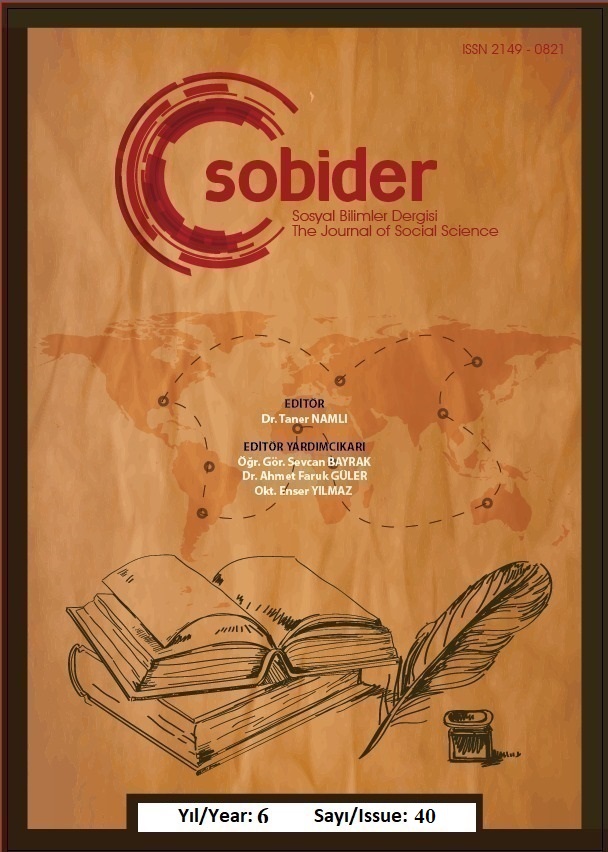Author :
Abstract
İşletmelerin sürdürülebilirliklerini sağlamaları ve aldıkları mesleki kararlar konusunda dikkatli olmaları gerekmektedir. Günümüzde meslek etiği diğer her meslek açısından önemli olduğu kadar muhasebe mesleğinde de önemlidir. Meslek etiği, meslek mensuplarının bireylere bağlı kalmadan tarafsız, dürüst ve güvenilir bir biçimde mesleklerini icra etmesidir. Bu çalışmada, ön lisans ve lisans düzeyinde eğitim görüp muhasebe dersi alan öğrencilerin muhasebe mesleğine yönelik etik algıları incelenmiştir. Araştırmanın ana kütlesini, Fırat Üniversitesinde eğitim gören ve muhasebe dersi alan öğrenciler oluşturmaktadır. Bu bağlamda çalışmanın örneklemi 452 öğrenciyi temsil etmektedir. Verilerin analizi için SPSS 22 istatistik programı kullanılmıştır. Araştırmanın sonuçlarına göre, ülkemizde meslek etiğinin muhasebe mesleği için son derece önemli olduğu ancak eğitimde ve uygulamada istenilen düzeyde yer verilmediği görülmektedir. Çalışmada elde edilen diğer bulgular ise, muhasebe dersi alan öğrencilerin etik algısının, öğrencilerin yaşları ve akademik birimleri bakımından farklılaşmadığıdır. Bu araştırmanın muhasebe etiği literatürüne katkısı olacağı düşünülmektedir.
Keywords
Abstract
Businesses need to ensure their sustainability and be careful about their professional decisions. Today, business ethics is important in accounting profession as well as important for all other professions. Business ethics is the performance of the profession in an impartial, honest and reliable manner regardless of the members of profession. In this study, the ethical perceptions of the students taking accounting course, are studying at associate degree and bachelor's level, are examined. The target group of the study is the students from Fırat University who are taking accounting course. In this context, the sample of the study consists of 452 students. SPSS 22 statistical program was used for data analysis. According to the results of the study, in our country it is seen that business ethics is very important for the accounting profession but it does not constitute the desired level in the education and practice. Other findings obtained from the study are the ethical perception of the students taking accounting courses does not differ in terms of the age and academic units of the students. It is thought that this research will contribute to the literature of accounting ethics.
Keywords
- Ağyar, E. Angay Kutluk, F. Cengiz, E. (2012). Meslek Yüksekokulları Muhasebe Bölümü Öğrencilerinin Sosyo-Ekonomik Değişkenler Işığında Mesleki Etiğe Bakış Açılarının İncelenmesi, Journal Of Yaşar University, 25 (7) , 4203-4228.
- Akdoğan. H. (2003). Muhasebe Meslek Etiğinin Kanunun Aydınlatılmasındaki Önemine Meslek Mensuplarının Yaklaşımları, Anadolu Üniversitesi Açık Öğretim Fakültesi Yayınları. No:783, Eskişehir.
- Akın, O. Özdaşlı, K. (2014). Muhasebe Meslek Mensuplarının Mesleki Faaliyetlerinde Uymaları Gereken Etik İlkelere Uyma Düzeyine Yönelik Meslek Mensupları İle Meslek Yüksekokulu Muhasebe Bölümü Öğrencilerinin Algıları, Muhasebe ve Finansman Dergisi, Temmuz, 59-74.
- Akyatan, A. Angay Kutluk, F. (2015). Muhasebe Dersi Alan Öğrencilerin Etik Karar Alma Sürecini Etkileyen Faktörler Üzerine Bir Araştırma. Journal Of Accounting, Finance and Auditing Studies, 1(4), 42-66.
- Aydın, H. Akdoğan, N. (1987). Muhasebe Teorileri, Gazi Üniversitesi Yayın No:98, Ankara.
- Ergün, H. Gül, K. (2005). Muhasebe Mesleği Etik Kuralları ve Bu Kuralların Meslek Mensuplarınca Algılanışı, Muhasebe ve Finansman Dergisi, 25, 144-154.
- İşgüden, B. (2007). Sosyal ve Kültürel Değerlerin Muhasebe Meslek Etiği Üzerine Etkileri Yüksek Lisans Tezi , Balıkesir Üniversitesi Sosyal Bilimler Enstitüsü İşletme Anabilim Dalı.
- Jonson, E. P.,McGuire, L. M. O’Neil, D. (2015). Teaching Ethics to Undergraduate Business Students in Australia: Comparison of Integrated and Stand-alone Approaches. Journal of Business Ethics, 132, 477-491.
- Karaman, Emir Seyit. (2015), “Muhasebe Meslek Etiği ve Muhasebe Meslek Mensuplarının Etik Kurallara Bakışı: Balıkesir İli Örneği”. Gazi Üniversitesi Eğitim Bilimleri Enstitüsü, Yüksek Lisans Tezi, Ankara.
- Kotar, E. (1997). Muhasebe Denetimi Mesleğinde Ahlakın Yeri Ve Önemi, III. Türkiye Muhasebe Denetimi Sempozyumu, Muhasebe Denetimi Mesleğinde Yetkiler, Sorumluluklar ve Meslek Ahlakı. 30 Nisan- 4 Mayıs 1997. Alanya, Antalya.
- Kutlu, H. A. (2008). Muhasebe Meslek Mensupları ve Çalışanlarının Etik İkilemleri: Kars ve Erzurum İllerinde bir Araştırma, Kafkas Üniversitesi İ.İ.B.F. Dergisi, 63(2), 143-170.
- Özalp, İ. (2004). Uluslararası İşletmecilik. Anadolu Üniversitesi, Yayın No: 1576, Eskişehir.
- Sayım, F. Usman, Ö. (2016). Muhasebe Meslek Mensuplarının Etik Algısı Yalova Örneği, Uluslararası Yönetim İktisat ve İşletme Dergisi, 16. Özel Sayısı, 247-261.
- Tepe, H. (1997). Etik ve Meslek Etikleri: Kavram ve Sorunlar, III. Ulusal Tesisat Mühendisliği Kongresi ve Sergisi, İzmir.
- Ünsal, A. (2009). Muhasebe Etik Eğitim Sistem Bileşenlerinde Sürekli Etkin Eğitim, Selçuk Üniversitesi Sosyal Bilimler Enstitüsü Dergisi, 22, 409-422.
- Yıldız, G. (2010). Muhasebe Mesleğinde Meslek Etiği ve Kayseri İl Merkezinde Bir Uygulama, Erciyes Üniversitesi İdari ve İktisadi Bilimler Fakültesi Dergisi, 36, 155-178.





